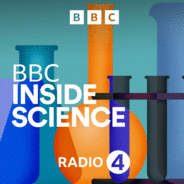As conflicts in the Middle East and Ukraine continue to dominate the news, many Inside Science listeners have been in touch with the same question: What is the carbon footprint of war? How significant is the impact – and is it crass to even talk about it? We’re joined by Benjamin Neimark from Queen Mary University in London. Also this week, we chat to the incoming DG of Europe’s particle-smashing facility Cern, what have we learnt by defrosting an extinct big cat and, the beetle that could ruin Christmas... Presenter: Marnie Chesterton
Producers: Florian Bohr, Ella Hubber & Gerry Holt
Editor: Martin Smith
Production Co-ordinator: Jana Bennett-Holesworth If you want to test your climate change knowledge, head to bbc.co.uk search for BBC Inside Science and follow the links to The Open University to take the quiz.

Wissenschaft & Technik
BBC Inside Science Folgen
A weekly programme that illuminates the mysteries and challenges the controversies behind the science that's changing our world.
Folgen von BBC Inside Science
641 Folgen
-
Folge vom 19.12.2024The climate cost of war
-
Folge vom 12.12.2024Nuclear medicine shortages and Jane Goodall on COP29A shortage of medical isotopes used to detect cancer has experts concerned that the shortfall could be delaying diagnosis and could even be costing lives. Exactly what these nuclear medicines are and how they are made is key to understanding the national scarcity. So, we’re going back to basics and learning all about medical isotopes. We also speak to world-famous conservationist and primatologist Jane Goodall who, now aged 90, continues to travel the globe campaigning to protect the natural world. Dame Goodall reflects on a life of studying our closest living animal relatives, chimpanzees, and as COP29 gets under way, speaks about the “closing window of time” to turn the tide on climate change and nature loss. Also this week, we answer the listener question “Why don’t we just throw nuclear waste into volcanoes?” and can Marnie spot AI vs real poetry? Presenter: Marnie Chesterton Producers: Ella Hubber & Gerry Holt Editor: Martin Smith Production Co-ordinator: Jana Bennett-Holesworth To discover more fascinating science content, head to bbc.co.uk search for BBC Inside Science and follow the links to The Open University.
-
Folge vom 05.12.2024COP29: Are climate summits working?This year is set to be the world’s hottest on record, likely shattering the aspiration to limit global warming to 1.5C above pre-industrial levels. So where does this leave COP29, the upcoming UN climate conference in Azerbaijan? This week Inside Science is asking, are climate summits really working? What is the point of them - and are they doing enough? Joining Marnie Chesterton to discuss this are: - Joanna Depledge, expert on international climate negotiations at the University of Cambridge - Mark Maslin, climate change professor from University College London (UCL) - Jim Watson, professor of energy policy, also from UCL Presenter: Marnie Chesterton Producers: Ella Hubber, Sophie Ormiston & Gerry Holt Editor: Martin Smith Production Co-ordinator: Jana Bennett-Holesworth If you want to test your climate change knowledge, follow the links on this page to The Open University to take a quiz.
-
Folge vom 28.11.2024Spooky ScienceIt’s our Halloween special from a rain-soaked Jodrell Bank in Cheshire. We find out what you can see in a dark, dark Halloween night sky with space-watcher and Professor of astrophysics Tim O’Brien. Also this week, we meet some blood-sucking leeches, the horrors of pumpkin waste and could zombies ever be real? Presenter: Victoria Gill Producers: Ella Hubber, Sophie Ormiston & Gerry Holt Editor: Martin Smith Production Co-ordinator: Jana Bennett-Holesworth To discover more fascinating science content, head to bbc.co.uk search for BBC Inside Science and follow the links to The Open University.
